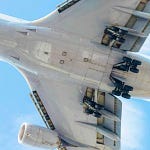In China, Chairman Mao Zedong saying “In times of chaos, opportunities abound.”
War has never been a factor that stops the rise of U.S. stocks, remains relevant today. Despite ongoing global turmoil, particularly in the Middle East, U.S. equity markets continue to show remarkable strength.
AIRO Group’s Dramatic NYSE Debut
On June 13, AIRO Group, an American aerospace and defense technology company, successfully went public on the New York Stock Exchange. The stock soared 140% on its first trading day, at one point nearly tripling in value and briefly reaching a market capitalization close to $1 billion. Trading was so volatile that circuit breakers were triggered multiple times. The stock ultimately closed at $24 per share, making AIRO the third company this month to see its share price double on its IPO day.
The IPO raised $60 million, with shares priced at $10 each—below the originally expected range of $14 to $16. However, investor enthusiasm remained high, with the offering being completed in just one day due to oversubscription. The number of shares issued was also increased to 6 million from the original plan.
Although the fundraising amount was not enormous, AIRO’s ambitions are much bigger. Chairman Chirinjeev Kathuria stated that the most important aspect of the IPO was to enhance the company’s qualifications and credibility, paving the way for larger government grants and bond market financing in the future.
Kathuria also revealed that AIRO plans to seek $200 million in support from Canada and will pursue further financing through the bond market. He emphasized that as a publicly listed company, AIRO will have greater credibility when bidding for NATO and U.S. Department of Defense projects.
Geopolitical Risks and Market Response
The Middle East has been a powder keg for over a thousand years, and the current situation is again tense: the conflict between Israel and Iran is escalating, fighting in Gaza continues, and the entire region is shrouded in the threat of war. Financial markets, especially sensitive to geopolitical risks, have experienced short-term volatility: oil prices have risen, safe-haven assets like gold have increased, and the U.S. dollar index has become more volatile.
Despite this, U.S. stocks have once again demonstrated impressive resilience and upward momentum, with the Dow Jones, S&P 500, and Nasdaq all approaching record highs. This reinforces a long-held market belief: “War has never been an obstacle to the rise of U.S. stocks.”
Historical Perspective: War and U.S. Stock Performance
Looking back, there is no absolute correlation between war and U.S. stock performance. Historically, U.S. stocks often experience short-term volatility during conflicts but tend to recover and even reach new highs over the medium to long term:
1991 Gulf War: U.S. stocks fell briefly at the start but rebounded as the U.S. military gained the upper hand. The S&P 500 rose over 25% in the following year.
2001 9/11 Attacks and Afghanistan War: Markets panicked and stocks plunged after reopening, but most losses were recovered within three months.
2003 Iraq War: Geopolitical risks and oil prices rose at the start, but U.S. stocks began a new bull run from March 2003.
2022 Russia-Ukraine War: Markets were shaken again, but U.S. stocks rebounded, especially tech stocks, leading to the “AI bull market” in 2023.
These examples show that while war triggers short-term risk aversion in markets, it has never fundamentally altered the long-term trajectory of the U.S. economy and corporate profits.
Russia, Iran, and the Shifting Middle East Landscape
On January 17, Russia and Iran signed a 20-year strategic agreement, but less than six months later, the relationship shifted. When Israel bombed Iranian nuclear facilities on June 13, Iran turned to Russia for help.
While Russia condemned Israel’s actions, President Putin told the Israeli Prime Minister that only diplomacy could solve Iran’s nuclear issue, and the Russia-Iran agreement does not include a mutual defense clause.
Russia is unlikely to intervene in a conflict between Iran and Israel. Putin is preoccupied with the war in Ukraine, and trade with Iran accounts for only about 1% of Russia’s total trade—hardly significant. The deeper reason is that former U.S. President Trump reportedly negotiated with Putin to keep Russia neutral at a critical moment, and neighboring countries have also coordinated with Trump, maintaining official neutrality while allowing Israeli air access, effectively isolating Iran.
Without Russian backing, Iran faces Israel and U.S. military pressure alone, while neighboring countries watch from the sidelines. Trump’s strategic maneuvering, together with Israel, led to a surprise attack on Iran, leaving its leadership vulnerable. Iran, now isolated and relying on its dwindling arsenal, may soon face internal unrest and regime change. Elon Musk’s Starlink service was quickly made available in Iran, allegedly to assist Israeli operations, raising questions about the level of coordination involved.
What’s Next?
With Iran isolated and under pressure, the question remains: who will face the next challenge in this rapidly evolving geopolitical landscape?






















Share this post